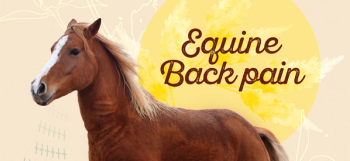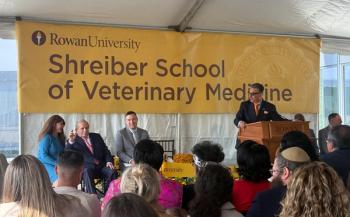
Equine herpes virus outbreak grows; California state veterinarian confirms 10 new cases
The California state veterinarian's office confirmed 10 new equine herpes virus (EVH-1) cases today, expanding the scope of the outbreak.
National Report
— The California state veterinarian's office reports 10 new cases of equine herpes virus (EVH-1) have been confirmed today.
The multi-state EHV-1 outbreak is spreading with cases now extending beyond Colorado and Washington state.
The outbreak was traced to the National Cutting Horse Association's Western National Championships in Odgen, Utah on April 30-May 8, as previously reported by
DVM Newsmagazine.
The latest EHV-1 cases in California are located in Kern, Placer, Stanislaus, Amador and Napa counties in California, according to the California Department of Food and Agriculture.
"One horse in Kern County was euthanized after showing severe neurologic signs often associated with the disease," CDFA reports. "All of the infected horses recently attended the National Cutting Horse Association’s Western National Championships in Odgen, Utah on April 30-May 8, 2011, where they were most likely exposed to the virus. All California horses that have been in contact with an infected horse and show signs of disease or test positive for (equine herpes myeloencephalopathy) will be placed under a CDFA quarantine in order to limit spread," the agency says.
California veterinary officials also report they contacted 54 exhibitors from California who participated in the Utah event and asked them to isolate and monitor their horses for clinical signs of EHV-1.
Officials say this outbreak is evolving and remains national in its scope.
As previously reported, two cases of EHV-1 have been confirmed in Colorado. More cases are suspected in multiple other Western states. Of the two confirmed cases, both horses have been euthanized, according to the Colorado Department of Agriculture. At least six Colorado horses in four counties are showing symptoms of the disease and are under quarantine.
As a result of the outbreak, Colorado State University’s (CSU) Veterinary Teaching Hospital announced May 16 it is immediately restricting all non-emergency equine and camelid veterinary appointments to prevent further exposure. The same measures were instituted at WSU and the University of California-Davis.
Officials from the National Cutting Horse Association (NCHA), which hosted the Utah event, says it received credible, but unconfirmed, reports of cases not only in Colorado and Washington, but also in Oregon, Arizona, California and Western Canada. The Washington Department of Agriculture is also reporting cases in Idaho and Utah.
Horse owners are being advised to notify veterinarians if they participated in the NCHA event or if their horse suddenly comes down with a temperature above 102-degrees-F, which typically precedes clinical signs.
Horses infected with the neurologic strain of EHV-1 may show signs including nasal discharge, lack of coordination, hind-end weakness, lethargy, urine dribbling and diminished tail tone. Veterinary treatment may include intravenous fluids, anti-inflammatory drugs and other appropriate supportive treatment. Immediate separation and isolation of identified suspect cases and implementation of appropriate biosecurity measures are key elements for disease control, CDFA reports.
Newsletter
From exam room tips to practice management insights, get trusted veterinary news delivered straight to your inbox—subscribe to dvm360.






